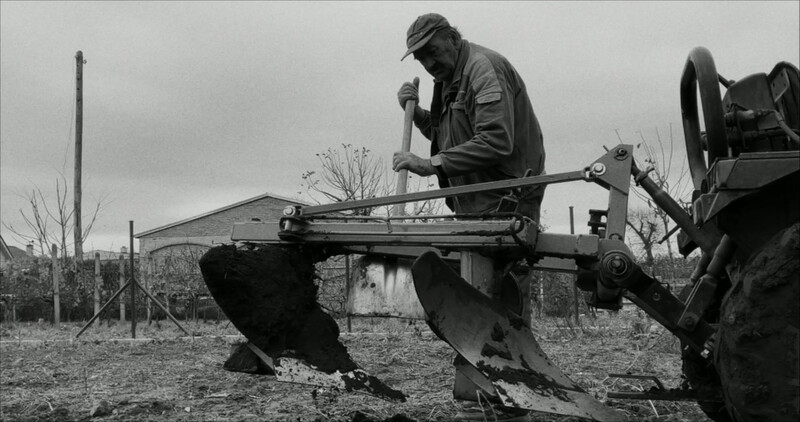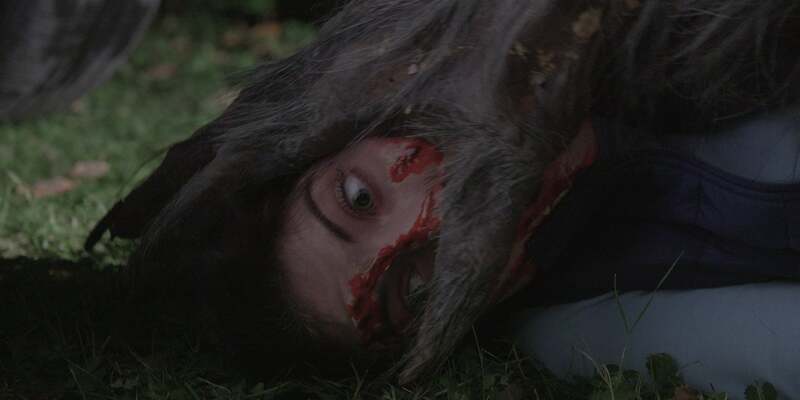
When Routine Becomes a Warning
MOVIE REVIEW
Blood Red
–
Genre: Drama, Documentary Hybrid
Year Released: 2025
Runtime: 1h 15m
Director(s): Martin Imrich
Where to Watch: shown at IDFA 2025
RAVING REVIEW: BLOOD RED opens with a sense of finality even before a word is spoken, the kind of atmosphere that tells you a world is holding itself together by instinct rather than optimism. Martin Imrich’s debut feature arrives as a stark, deliberate piece of hybrid filmmaking, rooted in the rhythms of rural Eastern Europe and shaped by the long shadow of agricultural life and the kinds of tasks that define survival rather than ambition. Shot in black and white and cut with the patience of someone who understands the value of stillness, this film occupies the space between documentation and sculpted narrative. It’s not unusual for a director’s first feature to lean on influence. Still, Imrich wears his inspirations openly, even bringing in Béla Tarr as a story advisor—a choice that signals exactly the kind of experience he’s aiming for.
What separates BLOOD RED from simple imitation is its understanding of environment. This is not a film that uses the land for background decoration; it treats the countryside as the most expressive figure in the frame. Marshland, construction waste, hunting rifles, livestock, both living and dead — each is presented without commentary, forcing us to confront a mode of living that doesn’t announce itself but quietly persists. Imrich approaches these images with a slow-moving camera that doesn’t intrude, drifting with an observational attitude that invites us into the monotony, the repetition, and the small shocks that break through the everyday. Whether those shocks are staged or captured is intentionally ambiguous, and that ambiguity contributes to the film’s tension.
The film’s quietness is both its strength and its limit. Imrich clearly believes in the power of long takes and the accumulation of detail, and at times, BLOOD RED becomes hypnotic, especially when the focus shifts to work routines that have remained unchanged for generations. The act of clearing land, preparing a hunt, or tending to animals becomes symbolic of a way of life that is both stable and constantly eroding. There’s a sense that the people on screen live at the mercy of forces far outside their control, but Imrich resists the temptation to simplify them into victims or martyrs. Instead, he shows a community that adapts because it must, even when that adaptation looks like resignation.
Where the film stumbles is in its relationship to performance. While marketed as a documentary, BLOOD RED incorporates sequences that reveal a degree of staging, and that fusion doesn’t always land cleanly. Moments involving animal handling or displays of masculinity feel heightened, distancing the audience rather than drawing them into the world. Viewers sensitive to depictions of animal death or hunting may find these scenes especially difficult. Because the film doesn’t contextualize them through interviews or commentary, they carry a blunt impact that can overshadow the nuance Imrich aims for. This is part of the intentional discomfort, but it can also make the film feel harsher than it needs to be.
Despite those missteps, the film’s central achievement is its depiction of people caught between eras. The countryside is too isolated to be influenced by the outside, yet too fragile to remain untouched forever. You can feel the weight of history pressing against these images, not through exposition but through the way workers move, the way tools are handled, the way animals are raised and slaughtered without ceremony. It’s a place where modernity hasn’t fully arrived, and the film suggests that when it does, it will not be gentle. The characters don’t speak openly about change, but their actions make the truth obvious: they know it’s coming, and they know they can’t stop it.
The cinematography by Imrich and Václav Pavlíček is the film’s most consistent asset. The black-and-white palette strips the environment down to essential contrasts — mud and sky, trees and machinery, bodies and tools — and the composition often feels like a series of photographic studies rather than traditional filmmaking. This gives BLOOD RED an artistic clarity that elevates even the most mundane tasks, but it also keeps the film emotionally distant. The camera observes without interpreting, and depending on your expectations, that can feel either refreshing or withholding.
As a debut feature, BLOOD RED is bold, uncompromising, and unmistakably shaped by the legacy of slow cinema. Its nomination in IDFA’s Envision Competition and the nod for Best First Feature make sense: this is a filmmaker testing boundaries rather than chasing accessibility. Its weaknesses are real — uneven hybrid elements, emotionally distant structure, imagery that risks overshadowing thematic intention — but its voice is strong enough that those flaws read as growing pains rather than fundamental issues.
BLOOD RED stands out not for narrative propulsion but for its willingness to sit with discomfort, to document the erosion of a place without romanticizing what’s left. It’s a stark, unadorned portrait of people who work because survival requires it, in a landscape that feels both ancient and temporary. Imrich may not yet have complete control over the balance between authenticity and design. Still, the foundation is here: a filmmaker unafraid of silence, duration, and the weight of an environment that speaks for itself, even when no one else does.
Please visit https://linktr.ee/overlyhonestr for more reviews.
You can follow me on Letterboxd, Instagram, Twitter, and YouTube. My social media accounts can also be found on most platforms by searching for 'Overly Honest Reviews'.
I’m always happy to hear from my readers; please don't hesitate to say hello or send me any questions about movies.
[photo courtesy of D1FILM, FAMU]
DISCLAIMER:
At Overly Honest Movie Reviews, we value honesty and transparency. Occasionally, we receive complimentary items for review, including DVDs, Blu-rays, CDs, Vinyl Records, Books, and more. We assure you that these arrangements do not influence our reviews, as we are committed to providing unbiased and sincere evaluations. We aim to help you make informed entertainment choices regardless of our relationship with distributors or producers.
Amazon Affiliate Links:
Additionally, this site contains Amazon affiliate links. If you purchase through these links, we may receive a commission. This affiliate arrangement does not affect our commitment to honest reviews and helps support our site. We appreciate your trust and support as you navigate these links.



Average Rating